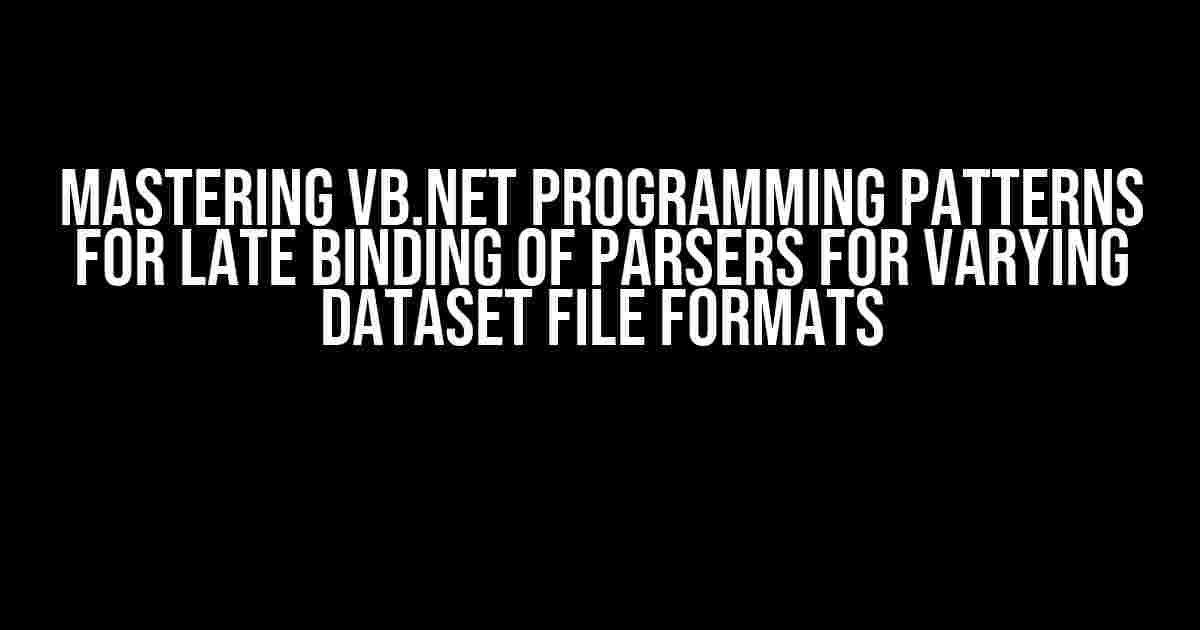Welcome to the world of dynamic data processing, where the ability to adapt to varying dataset file formats is crucial for success. In this article, we’ll delve into the fascinating realm of VB.NET programming patterns for late binding of parsers, empowering you to tackle diverse file formats with ease and confidence.
Understanding Late Binding and Its Importance
Imagine you’re tasked with developing a data processing application that can handle a plethora of file formats, from CSV and JSON to XML and beyond. A traditional approach would involve writing separate parsers for each format, resulting in a bloated and maintenance-intensive codebase. This is where late binding comes to the rescue, allowing you to dynamically load and utilize parsers at runtime, rather than during compile time.
By embracing late binding, you can:
- Reduce code complexity and maintenance burdens
- Improve flexibility and adaptability to changing file formats
- Enhance application performance by loading only necessary parsers
Crafting a Flexible Parser Framework
To create a robust parser framework, we’ll employ the following design principles:
- Parser Interface: Define a common interface for all parsers, outlining the necessary methods for data processing and error handling.
- Parser Factory: Develop a factory class that can dynamically create instances of parsers based on file format requirements.
- Parser Registry: Implement a registry that stores parser instances and their corresponding file format associations.
' Define the Parser Interface
Public Interface IParser
Sub ProcessData(data As String)
Function GetSupportedFormat() As String
End Interface
' Create a Parser Factory
Public Class ParserFactory
Public Shared Function CreateParser(format As String) As IParser
Select Case format
Case "CSV"
Return New CSVParser()
Case "JSON"
Return New JSONParser()
Case "XML"
Return New XMLParser()
' Add more format-specific parsers as needed
Case Else
Throw New NotSupportedException("Unsupported file format")
End Select
End Function
End Class
' Implement the Parser Registry
Public Class ParserRegistry
Private Shared parserInstances As New Dictionary(Of String, IParser)
Public Shared Sub RegisterParser(format As String, parser As IParser)
parserInstances.Add(format, parser)
End Sub
Public Shared Function GetParser(format As String) As IParser
If parserInstances.ContainsKey(format) Then
Return parserInstances(format)
Else
Throw New KeyNotFoundException("Parser not registered for format")
End If
End Function
End Class
VB.NET Patterns for Late Binding
Now that we have our parser framework in place, let’s explore the VB.NET patterns that enable late binding of parsers:
Reflection and Activator.CreateInstance
Leverage the power of reflection to dynamically create instances of parsers based on file format requirements.
' Using Reflection to create a parser instance
Dim parserType As Type = GetType(ParserFactory).Assembly.GetType($"ParserFor{format}")
Dim parser As IParser = CType(Activator.CreateInstance(parserType), IParser)
Dynamic Method Invocation
Use dynamic method invocation to execute parser-specific methods, eliminating the need for explicit type casting.
' Dynamic method invocation for data processing
Dim data As String = "parser-specific data"
Dim method As MethodInfo = parser.GetType().GetMethod("ProcessData")
method.Invoke(parser, New Object() {data})
Late-Bound Delegates
Create late-bound delegates to decouple parser creation from execution, allowing for greater flexibility and scalability.
' Define a late-bound delegate for parser creation
Dim createParser As Func(Of String, IParser) = Function(format) ParserFactory.CreateParser(format)
' Use the delegate to create a parser instance
Dim parser As IParser = createParser("CSV")
Putting It All Together
Let’s tie up the loose ends by creating a sample application that demonstrates the power of VB.NET programming patterns for late binding of parsers:
Module Program
Sub Main()
' Register parsers for supported file formats
ParserRegistry.RegisterParser("CSV", New CSVParser())
ParserRegistry.RegisterParser("JSON", New JSONParser())
ParserRegistry.RegisterParser("XML", New XMLParser())
' Load a file and determine its format
Dim file As String = "example.csv"
Dim format As String = GetFileFormat(file)
' Create a parser instance using the factory and registry
Dim parser As IParser = ParserRegistry.GetParser(format)
' Process the file data using the dynamic parser
parser.ProcessData(File.ReadAllText(file))
Console.WriteLine("Data processed successfully!")
End Sub
Function GetFileFormat(file As String) As String
' Implement file format detection logic here
Return "CSV"
End Function
End Module
Conclusion
With these VB.NET programming patterns for late binding of parsers, you’re now equipped to tackle diverse dataset file formats with ease and confidence. By harnessing the power of late binding, reflection, dynamic method invocation, and late-bound delegates, you can create flexible and adaptable data processing applications that stand the test of time.
| Parser Pattern | Description |
|---|---|
| Reflection and Activator.CreateInstance | Dynamically create parser instances based on file format requirements |
| Dynamic Method Invocation | Execute parser-specific methods without explicit type casting |
| Late-Bound Delegates | Decouple parser creation from execution for greater flexibility and scalability |
Remember, the key to mastering late binding lies in embracing the dynamic nature of VB.NET and adapting to the ever-changing landscape of dataset file formats.
Here are 5 Questions and Answers about “VB.NET programming patterns for late binding of parsers for varying dataset file formats” in a creative voice and tone:
Frequently Asked Question
Get the answers to your most pressing questions about late binding of parsers for varying dataset file formats in VB.NET programming!
What is late binding of parsers in VB.NET, and why do I need it?
Late binding of parsers in VB.NET refers to the ability to dynamically load and use different parser libraries at runtime, depending on the type of dataset file format being processed. You need it because it allows your application to handle various file formats without having to recompile or redeploy your code. It’s like having a superpower that lets you adapt to different file formats on the fly!
How do I implement late binding of parsers in VB.NET using reflection?
To implement late binding of parsers in VB.NET using reflection, you can use the System.Reflection namespace to load the parser assembly dynamically at runtime. You’ll need to create an instance of the parser class using the Activator.CreateInstance method, and then invoke the parser’s methods using reflection. It’s like building a puzzle, where you need to find the right pieces and put them together in the right order!
What are some common patterns for late binding of parsers in VB.NET?
Some common patterns for late binding of parsers in VB.NET include the Factory pattern, the Strategy pattern, and the Dependency Injection pattern. These patterns help you decouple the parser implementation from your application logic, making it easier to switch between different parsers at runtime. It’s like having a toolbox full of different tools, each designed for a specific task!
How do I handle errors and exceptions when using late binding of parsers in VB.NET?
When using late binding of parsers in VB.NET, it’s essential to handle errors and exceptions properly to ensure that your application remains stable and reliable. You can use try-catch blocks to catch and handle exceptions, and also implement logging and error reporting mechanisms to diagnose and fix issues. It’s like having a backup plan in case something goes wrong!
What are some best practices for late binding of parsers in VB.NET?
Some best practices for late binding of parsers in VB.NET include using interfaces to define the parser contract, implementing parser-specific logic in separate assemblies, and using configuration files or databases to store parser settings. These practices help you maintain a flexible and scalable architecture that can adapt to changing requirements. It’s like following a recipe to create a delicious cake – you need to have the right ingredients and follow the right steps!


